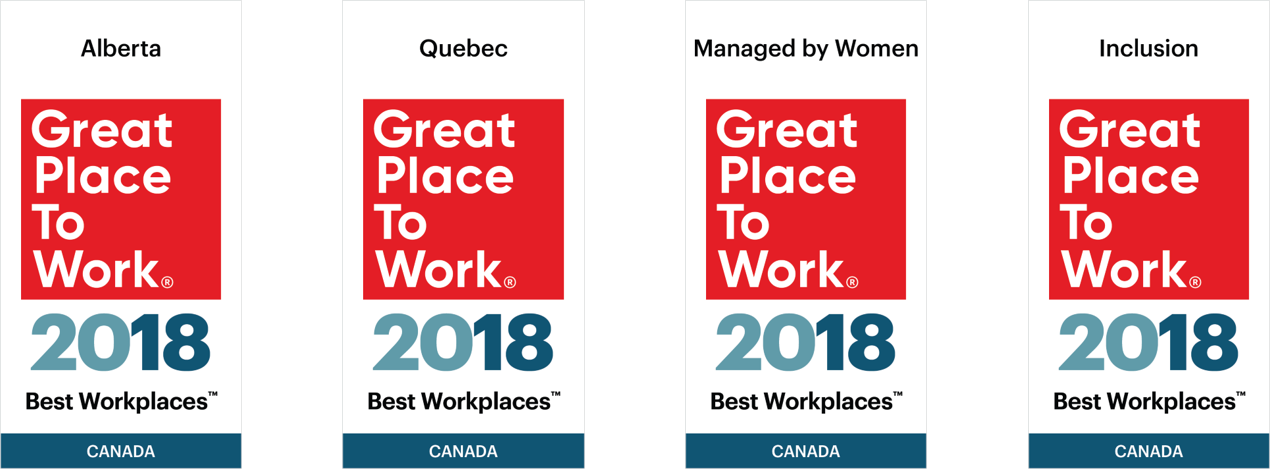Great Place to Work® is pleased to announce the 2018 list of Canada’s Best Workplaces in British Columbia. To be eligible for this list, organizations must be Great Place to Work Certified™ in the past year, be headquartered in British Columbia, and have at least 15 employees working in the province. We determined the BEST based the overall Trust Index score from their B.C. based employees.
British Columbia is currently enjoying record low unemployment and at least 50% of BC employers are projecting growth in the next year. Does all this point to a strong labour market outlook?
Tony Ariganello, CEO for the Chartered Professionals in Human Resources of British Columbia and Yukon (CPHR BC & Yukon) cautions that this situation is not as simple as it seems: “We think low unemployment is good, but if we don’t have people to fill those jobs, the economy doesn’t move forward. British Columbia does have low unemployment, but only in specialized sectors. On the technology front, there are many demands for workers but in other sectors there are individuals continuing to search for jobs. Marketing jobs, for example, are not as easy to attain in BC, largely because there are not as many large enterprises here.”
Ariganello offered insights on what BC employers and policy makers can do to address the skills gap and ensure we’ll be able to attract the right people with the right skills into the right positions throughout the province to support continued innovation and economic growth.
Focus on skills training
According to Ariganello, first and foremost, British Columbia needs to minimize the skills gap through targeted skills training programs to ensure that workers coming down the pipeline are skilled to perform the jobs that are available in the local market. “We believe government should be spending much more in this area. In Quebec, for example, the government recently launched a Labour Market Strategy, and committed to investing $180 million dollars over five years, specifically on training to ensure the population will be able to handle the jobs of the future”. However, skills training is a bit of a moving target; many of the jobs we’ll need to fill five years from now, especially those related to artificial intelligence, don’t even exist yet. Skills development needs a coordinated approach, government support and an innovation mindset to ensure the BC labour market will be able to meet employer demands of the future.
A broader definition of work-life balance
Great Place to Work® research shows that work-life balance is the primary motivating factor for British Columbians when choosing an employer; more so than career advancement, compensation & benefits or job security. But work-life balance is not just about flexitime and sabbaticals. According to Ariganello, work-life balance is really about helping employees reach their goals within the context of their environment. “For example, we know the cost of living in BC is high, especially in Vancouver. To attract someone to work here, employers need to recognize this reality and equip employees with financial awareness, including a plan to build savings and financial security, so they don’t have to live paycheque to paycheque”.
In some cases, helping employees reach their goals means changing the environment altogether. BC employer Traction on Demand has recently launched their Small Town Initiative, which explores new markets as career destinations, showcasing the advantages and challenging the common misconceptions about living and working outside traditional hubs. In the first phase of this initiative, they’ll be opening an office in Nelson, BC, supporting the voluntary relocation of Tractionites to the new office and recruiting new employees who want to work in Nelson. The Small Towns Initiative was conceived out of Traction on Demand’s core value of building communities. The urban housing market in Canada (and in Vancouver specifically) is pricing families out of the opportunity to create a permanent home. There's a growing desire to put down roots in places that offer a great quality of life alongside affordability. Building this new office ensures that individuals maintain a connection to their community and have the opportunity to build something new and exciting, all while supporting Traction on Demand’s longer-term growth and retention strategy.
Expand opportunities for aboriginals
Even with record low unemployment in BC, the unemployment rate for the Indigenous community is three to four times higher than it is for the rest of Canada. “We need to be doing more to improve training opportunities for Aboriginals and the Indigenous community” says Ariganello. “By expanding mentoring and internship opportunities for Aboriginal talent, we will be able to better connect them to the job market.”
For the past several years, BC employer Urban Systems has participated in Aboriginal Business Match, a technology facilitated business matching event that connects a national network if Indigenous and non-Indigenous decision makers to create face-to-face, results driven opportunities for business success. AMB is based on the belief that building effective business relationships between Aboriginal communities, their non-Aboriginal neighbours and the private sector is imperative to the future of Canada’s economy, and to society as a whole.
High trust workplaces fuel innovation
New research from Great Place to Work shows that high-trust workplace cultures are seeing faster rates of success by inviting every employee into the innovation process. By focusing on Innovation by All, these organizations operate with greater agility, beat sales targets, and outperform the competition. Sign up here to receive this research first!
Think your organization is a great workplace?
Register today to become Great Place to Work Certified™. Get recognized for the outstanding culture you’ve built or let us help you create a more productive work environment. Or attend one of our free live webinars to learn more.
Upcoming Lists

About our lists
Great Place to Work® publishes a series of Best Workplaces™ lists based on feedback from more than 300,000 employees at Great Place to Work Certified™ organizations across all industries in Canada. Employees complete an anonymous Trust Index© survey, answering questions about how frequently they experience behaviors that create a great workplace, including, the transparency of communication, degree of collaboration, quality of benefits programs, opportunity for professional development, and support for work-life balance. If 7/10 employees respond positively to the survey, the organization becomes Great Place to Work Certified™ for one year. Results from the survey are highly reliable, having a 95% confidence level with +/- 5% margin of error.
About Great Place to Work®
Great Place to Work® is the global authority on high-trust, high-performance workplace cultures. Through proprietary assessment tools, advisory services, and certification programs, GPTW recognizes the world's Best Workplaces™ in a series of national lists including those published by The Globe & Mail (Canada) and Fortune magazine (USA). Great Place to Work® provides the benchmarks, framework, and expertise needed to create, sustain, and recognize outstanding workplace cultures.
Follow GPTW online at www.greatplacetowork.ca and on Twitter at @GPTW_Canada






